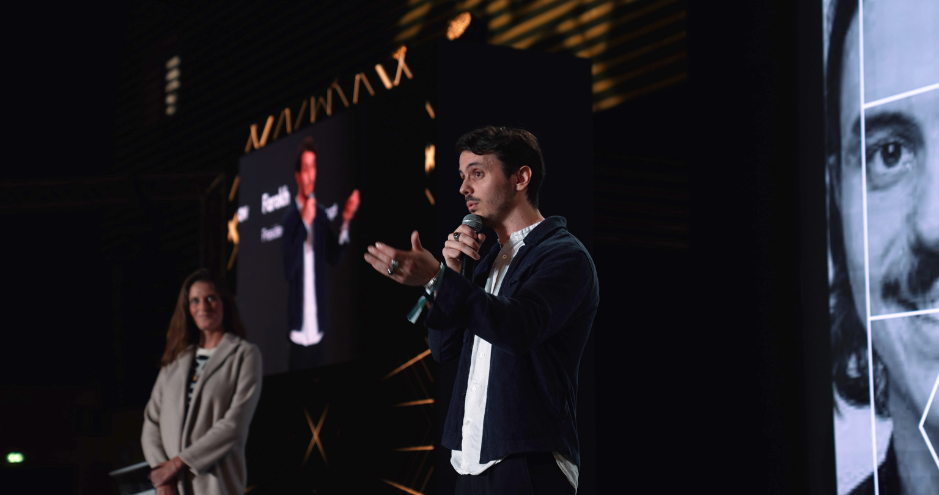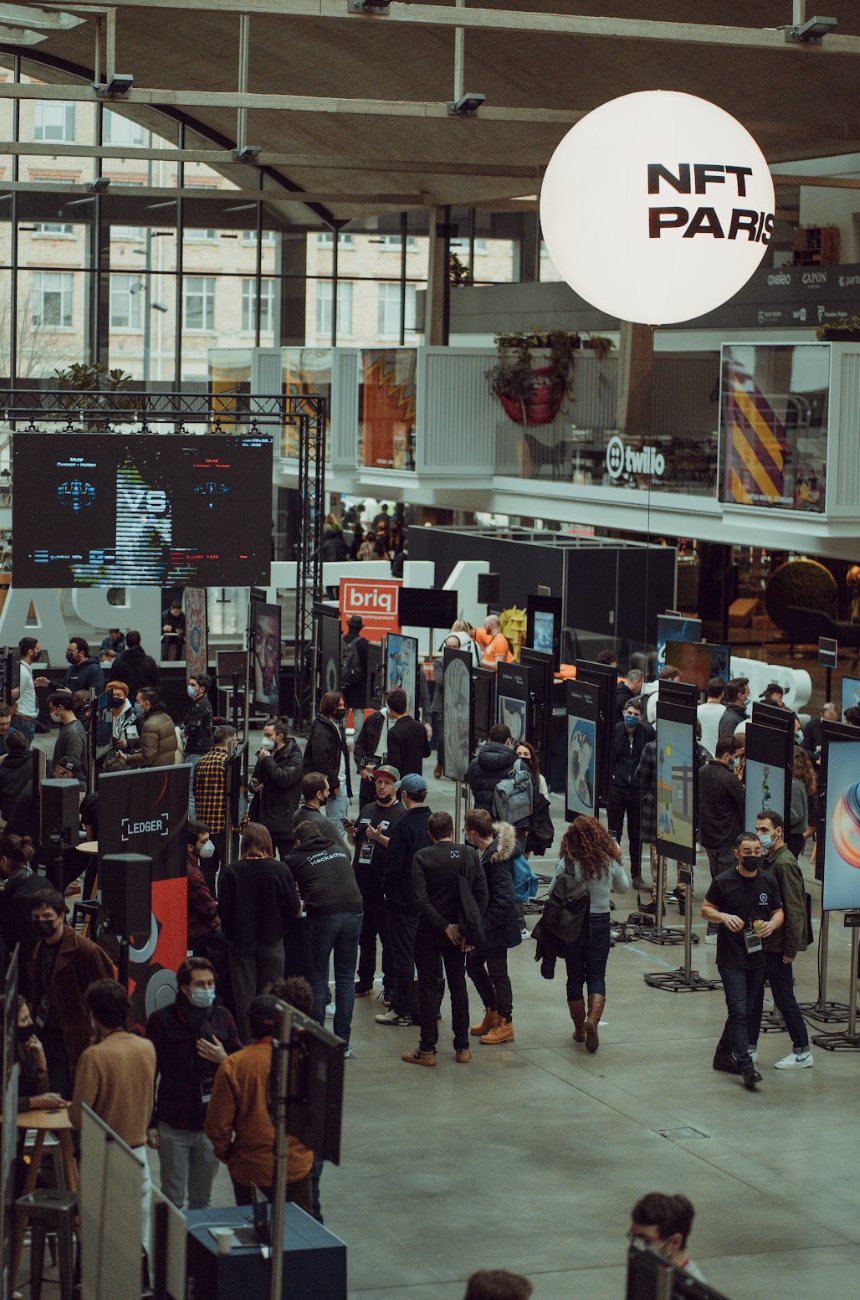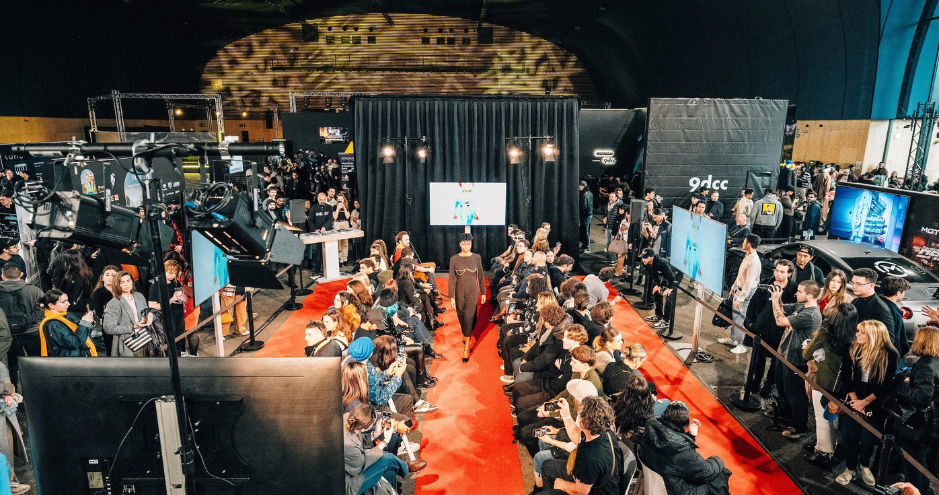NFT Paris: Journey into the future of WEB3 events
While the world of NFTs (Non-Fungible Tokens) is booming, revolutionizing how we perceive the ownership and value digital works of art, only 15% of French people claim to be familiar with NFTs, according to a ConsenSys 2023 survey. 15% was just enough for Alexandre Tsydenkov, who decided to launch the first and only NFT event in France: NFT Paris. Initiated three years ago while Alexandre was still a student at HEC Paris, the event is today a global reference in the world of WEB3. If you’ve ever wondered how major events emerge, and become an instant success, read our incredible interview with NFT Paris main co-founder’s Alexandre Tsydenkov.

Can you walk us through your academic and professional background?
Alexandre Tsydenkov: I began with preparatory classes before pursuing the Master in Management at HEC Paris. However, I quickly realized that working in consulting groups wasn’t for me. Entrepreneurship was where I wanted to go. From my early years of study, I developed many projects around entrepreneurship, absorbing all available resources on the subject, and multiplying encounters with HEC Alumni entrepreneurs. My gap year was clearly the catalyst for this budding passion, and equipped me with skills entrepreneurs sometimes lack. I first worked in sales at Bouygues Telecom Entreprises to learn how to sell in a structured way, and then in product development at Okarito to understand how a product ‘works’. These experiences shaped my understanding of the business world, and strengthened my determination to create something meaningful.
When did NFTs come into the landscape?
Alexandre Tsydenkov: During my studies, I was starting to become passionate about NFTS, collecting them and being very active on X (formerly Twitter). By then, I knew it was my field of predilection. For my final year of studies, I joined the MSc X-HEC Entrepreneurs. There, I met many people who shared the same interest as me in NFTs. And since I had to come up with an entrepreneurial project, I decided to launch a project around NFTs with other classmates. The next day, we announced the first NFT Paris on X, and that was it! No turning back. We had to deliver… in only four months.
How did you manage to structure NFT Paris in such a short period of time?
Alexandre Tsydenkov: With the help of a motivated team! Four of us were originally working on the project, with Côme Prost-Boucle and myself leading the project. Soon enough, 15 other people joined! As much as it was a collective effort, I was the one who initiated the project, and as a matter of fact the one bearing all the financial consequences – and we were talking about a €200,000 event. The road wasn’t easy. Organizing an event of this magnitude requires considerable resources: finding sponsors, securing the venue, gathering renowned speakers, and selling tickets. But our determination was unwavering.
We received a lot of support from the HEC Paris Innovation & Entrepreneurship Institute, which helped us secure the venue at Station F, and to find sponsors and speakers. Arianee, the Sandbox and Ledger were among the first ones to take part in the adventure as partners. Working on all the aspects at the same time was challenging but our efforts paid off! The first edition of NFT Paris was an incredible success: it attracted over 800 participants.

Had you anticipated such a success?
Alexandre Tsydenkov: Let’s say we were pretty confident. Just like in any entrepreneurial venture, we tested our idea first. We organized two small NFTs events in bars in Paris, hoping to have around 50 participants. In the end, more than a hundred people showed up at each event! At the same time, we noticed a growing interest around NFTs in France, especially on X (ex-Twitter) where we published a lot of teasers about the upcoming event. It was becoming pretty exciting, and as soon as the ticket sale opened, we were sold out in seconds!
From 800 to 18,000 participants, and from 15 to 120 partners in just one year, how did you manage this ‘tour de force’?
Alexandre Tsydenkov: The strong interest for NFTs in France was becoming obvious. However I think it was a conjunction of several factors. First, the event resonated with the NFTs events held in the USA. People were just expecting a similar event in France. Luckily for us, our competitor in New York delivered an ‘average’ event three years back. We, on the contrary, focused on offering an event with a very high quality standard. Additionally, hosting edition 2 in an iconic venue such as the Palais Éphémère, by the Eiffel Tower, helped tremendously. Finally, we gambled on a new approach, which involved expanding internationally. The idea was to target a broad and diverse audience, and to highlight France's technological and cultural richness in arts, gaming, entertainment, music, film, sport...

Yet, aiming high meant increasing the effort. For the second edition, we moved from Station F's 900 square meter surface to 10,000 at the Grand Palais Éphémère. This implied attracting 10 times more people and being 20 times more aggressive in terms of reach. In 2021, NFT Paris was a strictly French event, by 2022 NFT Paris had become the European reference.
What’s next for you and for NFT Paris?
Alexandre Tsydenkov: We are excited to announce the launch of XYZ Paris, an event focused on the transformative potential of Generative AI, taking place at Station F on September 27. Inspired by the success of NFT Paris, our plan is to start with Station F as the perfect location for the inaugural edition and then scale up in the coming years. Our long-term vision is to create a significant event that brings together multiple disruptive technologies, including AI, blockchain, and XR.
We believe that the convergence of these technologies is inevitable and will have a profound impact on society. NFTs and blockchain are already revolutionizing capitalism by enabling digital property rights, which were absent in web2. Generative AI, on the other hand, is transforming the way we interact with the internet by automating tasks, enhancing creativity, and potentially spreading intelligence globally. Finally, XR technology is providing us with immersive experiences in the digital world.

However, we understand that building a comprehensive event that covers all these technologies requires a step-by-step approach. Currently, the AI and web3 communities are relatively separate, mainly due to the speculative nature of the latter. Therefore, our strategy is to wait until these different communities reach a certain level of maturity before bringing them together for a unified conversation.
What would be your advice to HEC Paris students?
Alexandre Tsydenkov: Get out of the classrooms! What we are taught is precious but it does not prepare us for the harshness of reality. Make the most of your time at HEC Paris to launch niche businesses, even very small projects. This is the only way to understand how hard entrepreneurship can be, and what it feels like to see your idea being rejected by the market. The very first idea is usually doomed to fail, so keep on trying and experimenting until you finally succeed.